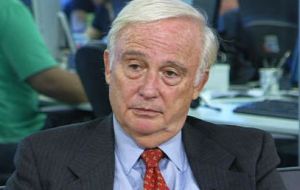MercoPress. South Atlantic News Agency
Falklands/Malvinas, an advance to celebrate
 Cisneros was a leading member of former foreign minister Di Tella's diplomatic team
Cisneros was a leading member of former foreign minister Di Tella's diplomatic team By Andrés Cisneros (*) - With the reinstatement of the 'impasse' on the issue of the Malvinas Islands, the Argentine government has made a wise decision. Not only because it puts in course again something proven useful in the past, but also because, looking into the future, there is no better path to the solution of the problem. It's not the mere restoration of a policy (good or bad) which already happened.
Nowadays a responsible use could mean a step that follows another step, and the two go up, not down.
In Argentina you always needed courage to take something from previous governments and simply pursue it because it was correct. That for example was done by former president Menem and Guido Di Tella with the excellent policy of former president Alfonsín and Caputo to end successfully a century of border conflicts with Chile.
You also need courage to review failed positions and, besides the expected makeup, now it emerges as practically coinciding with that which was so disputed. It's good news: following a painful decade of exasperations and hostilities, representatives from Kirchnerism now accept the non immediate discussion of sovereignty and even propose cooperation with the UK.
At the same time outstanding militants from some groupings of the incumbent Cambiemos (Let's change) or close to that alliance and who for some time staunchly opposed to this policy, now argue that the path is to cooperate on all other issues with the UK, even when the British refuse to accept discussing the Islands sovereignty. Di Tella must be smiling.
This also entails the seed of a good news: although nobody yet admits to acknowledging it, the basis for a common address on the Malvinas is consolidating: elements in the event of a State policy, without which we will never be able to solve the problem of the Islands, and quite soon, Antarctica.
Us Argentines have been divided for too long: some of us believed that while we couldn't discuss sovereignty, the best was to agree on other areas so as to generate a climate of understanding which will smooth the way towards a negotiation that inevitably will come.
Others insisted that if the Crown refused to discuss sovereignty from the very start, then Argentines would refuse to discuss on any other issue. The British merry.
A war had to happen and another quarter century for several important characters of this last position to start to temper down their intransigency and even propose as their own, an idea that is central to our adversaries: let's tolerate, (even if we don't accept it), this impasse in the sovereignty discussion and let's advance in the other aspects of the relation while we strengthen as a country in the world.
It's useless to argue now who was right. We must celebrate that the Malvinas issue, seems to be filing down discrepancies to privilege coincidences. The solution to this issue will not emerge only from the cunning of jurists or diplomats, but under the pressure of national and world public opinion. Advances in such very important issues as human rights, narcotics, armed violence, racism or the environment, have happened because many rulers had no choice but to yield to the pressure of world public opinion and in their own countries.
The solution to the Malvinas will come when Argentina is again an important country in the world and has robust State policies with domestic support. The recent reinstatement of the sovereignty umbrella and the review of positions that only ten minutes ago repeated sonorously patriotic intransigence, are very good news in that direction.
(*) Andrés Cisneros in a former deputy foreign minister, under Guido Di Tella and currently a member of the Argentine Political Club





Top Comments
Disclaimer & comment rules-

-

-

Read all comments“to generate a climate of understanding which will smooth the way towards a negotiation that inevitably will come”
Feb 23rd, 2016 - 08:29 am 0Inevitably? No inevitability about it.
“The solution to the Malvinas will come when Argentina is again an important country”
The solution will come when Argentina accepts the will and rights of the Islanders.
More opium for the people.
World public opinion is not going to force a self-governing population to join Argentina against their expressed wishes and democratic will.
Feb 23rd, 2016 - 08:47 am 0They still seem to think that the future of the Islands is in the hands of Westminster.
The islands and surrounding maritime and antarctic territories and RESOURCES are very important to the UK, we are not just going to hand over out territory and RESOURCES and future prosperity of the UK to Argentina or anyone else. No matter how nice they now want to be.
1- He has also “conveniently” overlooked that here in the Islands we have been on the receiving end of 14yrs of hatred and vile abuse from Argentina- so we just quietly are to forget that and shelve it and promise overnight to become friends and forget it all?????????????????
Feb 23rd, 2016 - 08:49 am 0These folks do just live in such a little Fantasy Bottle! It will take 10 year minimum - probably 25 to just get back to where we were as regards Islands-Arg relations pre 2002.
Yep- best solution Argentina- quietly shelve the Sov. question - and allow it to permanently and quietly fade away and die.
Commenting for this story is now closed.
If you have a Facebook account, become a fan and comment on our Facebook Page!